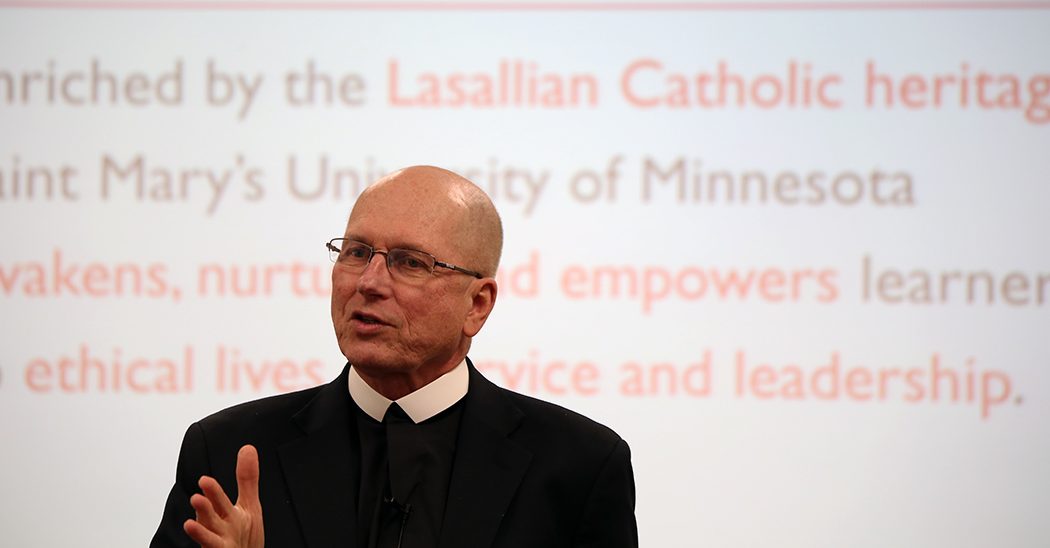The following is the second of a two-part series that examines being Lasallian in the modern world. Read part one.
The Lasallian charism is … inclusive
During his February talk, “Being a Catholic and Lasallian University in Today’s Diverse World,” Brother Thomas Johnson, FSC, emphasized how the Lasallian Catholic heritage — and the Saint Mary’s mission statement — is rooted in practicality and creativity. It can respond, change, inform, and grow in a dynamic fashion that facilitates religious diversity of faculty, staff, and students across the world.
Currently, the Lasallian network of schools includes institutions in 81 countries, ranging from preschools to universities. Furthermore, approximately 4,000 Christian Brothers work alongside approximately 56,000 educators to teach in the Lasallian tradition. In the United States alone, there are more than 100 Lasallian educational institutions, including six colleges and universities.
Many Lasallian schools are based on five core principles:
- Respect for all persons: Honor and respect the dignity of all individuals.
- Quality education: Engage in quality education together as students, staff, and faculty by thinking critically and examining our world in light of faith.
- Inclusive community: Celebrate diversity and welcome all members of our community.
- Concern for the poor and social justice: Remain in solidarity with the poor and advocate for those suffering from injustices.
- Faith in the presence of God: Believe in the living presence of God in our students, in our community, and in our world.
“I have met Hindus, Jews, Muslims, and Buddhists who call themselves Lasallian because they take elements of the holistic Lasallian education, the notion of touching hearts and being student-centered, choosing correction over punishment, and apply it themselves as teachers,” Brother Thomas shared during his Twin Cities Campus presentation.
“While Lasallian education is always based in Catholic teaching and belief, elements of it apply to people who are not Christian. For that reason, people of many faiths and all faiths or no faiths can sometimes call themselves Lasallian. Hence, we talk about a Lasallian vocation — not only Brothers but those who feel called to this charism in some mysterious way.
“It’s more than working together, but also being completely committed to the larger goals of the Lasallian mission incarnated in a very particular place. Saint Mary’s is a unique, particular way of living out this Lasallian charism.”
— Brother Thomas Johnson, FSC
“It’s more than working together, but also being completely committed to the larger goals of the Lasallian mission incarnated in a very particular place,” Brother Thomas said. “Saint Mary’s is a unique, particular way of living out this Lasallian charism.”
Brother Thomas ended his presentation with a testimonial from a Saint Mary’s professor who shared a story about a doctoral student who was one of 11 children raised by their grandparents. The student could articulate well verbally, but his writing skills were at a grade-school level. Seeing this, the faculty member offered to buy grade-school writing workbooks and tutor him on Saturdays, sometimes meeting for 10 straight hours to improve his writing.
“Today I had the honor of being a reader on his summary paper. While it isn’t perfect, it’s graduate level and an incredible testament to what can happen when you bring together people who care about learning and care about others,” Brother Thomas said, quoting the professor.
“Incidentally his paper was a proposal to develop mentoring programs for African-American male children to prevent them from falling through the cracks in the public education system.”
Like the teacher in that example, being Lasallian largely centers on placing one’s energy in educating young people by using a combination of faith and zeal, an appreciation for the presence of God, care and concern for the poor and marginalized and a trust in the providence of God to form an educational faith community, Brother Thomas said to those gathered.
“The students are our disciples because we are sharing something of ourselves and our lives with them,” he said. “It’s more than just information that we give when we are educating. We share ourselves, our beliefs, and our life.”
Featured image: Brother Thomas Johnson, FSC delivers his talk, ‘Being A Catholic and Lasallian University in Today’s Diverse World’ at the Twin Cities Campus on Thursday, Feb. 13.
RELATED MATERIAL:
Saint Mary’s Magazine (Fall 2007): “Living and Learning Lasallian”
